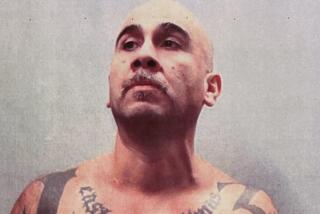Fowlie Formally Charged on 26 Drug-Related Counts : Crime: The alleged marijuana kingpin was granted a delay of arraignment. If convicted on all charges, he could be sentenced to life in prison and fined $2 million.
- Share via
SANTA ANA — The alleged kingpin of a massive marijuana smuggling ring based on a secluded Orange County ranch was formally charged in federal court Tuesday on 26 drug-related felony counts.
A day after his extradition from Baja California to the United States, Daniel James Fowlie, 57, was notified of the charges during a brief court appearance at which U.S. Magistrate Ronald R. Rose unsealed a grand jury indictment returned in June, 1988.
At the request of the defense, Rose postponed until July 10 Fowlie’s arraignment and a hearing to determine whether bail should be set. Fowlie’s attorney, James Riddet, told Rose that the defense had not had time to prepare arguments because the extradition happened so quickly.
Fowlie, dressed in dark blue pants and a light blue shirt, sat passively during the hearing. He is being held without bail at the U.S. Metropolitan Detention Center in downtown Los Angeles. If convicted on all counts, he could face a maximum penalty of life in prison and a $2-million fine.
In the 32-page indictment, Fowlie is accused of income tax evasion, distributing or intending to distribute about 53,000 pounds of marijuana, failing to report the shipment of hundreds of thousands of dollars overseas and operating a continuing criminal enterprise.
Investigators suspect that Fowlie operated one of the largest marijuana smuggling operations in the United States from 1982 to 1986, using rented warehouses in Orange County and Rancho del Rio, a 213-acre property straddling the Orange and Riverside county border. So far, six people, including Fowlie’s two sons, have been convicted on drug charges.
Court records indicate that Fowlie is believed to have set up a network of drug suppliers that included Francisco Javier Caro-Payan and his cousin, Rafael Caro-Quintero.
Payan, the suspected chief of drug operations in Baja California, was convicted in San Diego and sentenced to 15 years in prison. Caro-Quintero, reputed to be a major marijuana trafficker, is accused of plotting the torture-slaying of U.S. Drug Enforcement Administration agent Enrique Camarena Salazar in 1985. Camarena was kidnaped off a Guadalajara street and later found slain.
Fowlie has called the case against him greatly exaggerated and the result of self-serving statements by convicted drug dealers who made up stories to avoid lengthy sentences. He vehemently denies any connection with Caro-Quintero or Caro-Payan.
The government contends that its case is based on the statements of convicted drug dealers allegedly associated with Fowlie and other evidence to corroborate their potential testimony at trial.
“This was a very lengthy investigation,” said Supervisory Special Agent Wylie B. Cox of the FBI’s Santa Ana office. “You just don’t go waltzing some of those witnesses into court.”
Fowlie’s return to the United States on Monday culminated a five-year investigation by FBI Special Agent Stanley Fullerton, IRS Special Agent Joseph Rowland and U.S. Customs Special Agent Robert M. Mattivi.
“The gratifying thing is that the Mexican government was very cooperative with us,” Mattivi said. “It gives me a great deal of satisfaction.”
Investigators say that to their knowledge no political pressure was brought against the Mexican government to extradite Fowlie. Rather, they said, he had exhausted his appeals in a three-year effort to fend off his return.
Mexican authorities turned Fowlie over to Mattivi and Fullerton during an official proceeding at the prison in La Paz where Fowlie was incarcerated. He was then flown to John Wayne Airport aboard a U.S. Customs Service plane.
More to Read
Sign up for Essential California
The most important California stories and recommendations in your inbox every morning.
You may occasionally receive promotional content from the Los Angeles Times.














